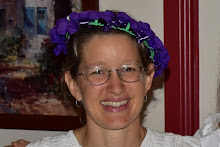Not having any older siblings myself, I can only speak from what I've observed in my own kids. However, I'm amazed at things that B is able to do at 20 months of age that E wasn't yet able to do, and P certainly wasn't anywhere near able to do.
I vividly remember P's verbal skills at 20 months, because that was when E was born. She could say single words, but they were typically hard to recognize ("bee" meant spoon, "na" meant towel, and several other items were "ba"). She never included more than one consonant in any word, using only vowel sounds to distinguish between "baby", "banana", "ball", and "book". I told Ari that we'd better not space subsequent kids that close together - having 2 little people who couldn't verbally communicate was just too difficult.
When E was 20 months old, he was starting to use 2-word sentences, and his pronunciation was leaps and bounds ahead of where P's had been at the same age. Of course, when P finally did learn to talk, she talked nonstop, and E was a convenient audience. He had at least double the live, personalized verbal interaction directed at him as P had had directed at her when she was that small.
Now that B is 20 months old, he has the benefit of 2 older siblings. They are both so much older than him that their pronunciation is practically perfect, as is their grammar. All morning long, they interact with letters and numbers, which B is able to observe but not really participate in. Like any small child, he is eager to catch up. So, at least a month ago, he started noticing words. He points at them and says, "E, O." When I read Goodnight Moon to him at bedtime, he takes my finger, points it to the words, and commands, "E! O!" Usually I satisfy this demand by telling him, slowly, what each word says. Sometimes he points to individual letters and I tell him what sound they make.
B has also become interested in numbers. Now, I remember that E was able to count to 10 by his second Christmas, when he was around 21 months old. Little B, however, has upped the ante by being able to recognize numerals from 1 to 8. He can recognize 9, but usually identifies it as a 6. (Of course, if you look at it upside down, they are the same thing - I'm not going to worry about my one-year-old's problems with reversals!) He'll take any counting book, open it entirely at random, and accurately identify the numeral while pointing at it: "Four! Seven! Eight!" While we were in the car waiting at a red light yesterday, I heard him announce, "One! Eight! Six!" I looked at the car beside us, and its license plate contained some letters and the numbers 98881. So, he thought the 9 was a 6, but other than that was exactly right. This afternoon, he started pointing out numbers on the box of disposable diapers in his room - a picture of a diaper is labeled from 1 to 6 describing all its fantastic features. The numbers are in no order at all, but he identified all of them correctly. The box informed us that it contained 140 diapers, and B pointed to those numerals and said, "One! Four! Round round round!" I told him that the round number was zero, and a minute later he correctly identified it.
I know, of course, that being able to say the name of a numeral has nothing to do with understanding that numbers have value. I'm working on helping him make the connection by holding up the right number of fingers each time he exclaims about a number, and I know it will come in time. But for now, I can at least brag that my 1-year-old is pre-reading: he understands that symbols stand for sounds or ideas. I'm pretty sure P and E are largely responsible for this early understanding. I'm already finding it easier to teach E to read than P - are the kids going to work me out of a job?
Tuesday, October 11, 2011
Subscribe to:
Posts (Atom)

